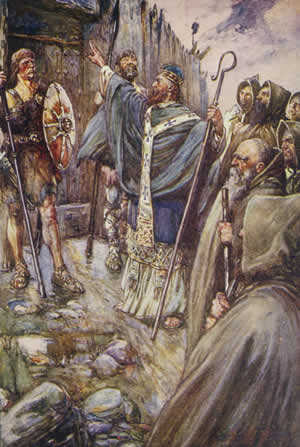Feast Day of Saint Columba who battled with the Loch Ness Monster and brought Christianity to Scotland
Saint Columba (Irish: Colm Cille) was born on the 7 December 521 near Lough Gartan, which was part of Tyrconnell and now in modern County Donegal, in Ireland. Columba's father was Fedlimid and his mother Eithne of the Cenel Conaill. He was the great-great-grandson of Niall Noígíallach, Irish high king who reigned in the late 4th and early 5 centuries, and ancestor of the Uí Néill family who were dominant in Ireland from the 6th to the 10th century. Columba is the patron-saint of the Irish city of Derry, where he founded a monastic settlement in c. 540. Columba died on June 9, 597 on the island of Iona (Scottish Gaelic: Ì Chaluim Chille). He is traditionally credited with the main role in the conversion of Scotland to Christianity when, in around 563, he and his twelve companions went to Scotland then settling in Iona, an island in the Inner Hebrides. It is the site of a monastery founded by the Irish Saint, then part of the Gaelic kingdom of Dál Riata, where the new abbey was a base for spreading Christianity among the northern Scottish Pictish kingdoms.
Much of what is known about about Saint Columba's life is recorded in Vita Columbae "The Life of St Columba" written by Adomnán of Iona. He was Abbot of Iona from 679 until his death in 704 AD. The book is also noted for giving the first written account of the Loch Ness Monster. It was said that Columba came across a group of people burying a man by the River Ness during his journey through the lands of the Picts. Columba was told that the man had been attacked by a “water beast” which had dragged him under the water. In this story Columba sent his follower Luigne moccu Min to swim across the river. When the beast came after him, Columba made the sign of the cross and ordered the beast to leave and the monster fled.
Saint Colomba died on Iona on 9th June 597 and this date is celebrated as his Feast Day, which is the annual religious celebration of a day dedicated to a particular saint. It is said that Columba's relics were removed in 849 and divided between Scotland, where they were sent by King Kenneth 1 for safekeeping to Dunkeland and Ireland where they were reputedly buried in Downpatrick, County Down, with St. Patrick and St. Brigid.






